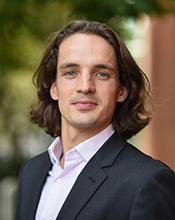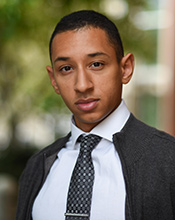As a participant in the Public Policy and International Affairs (PPIA) Fellowship Program — a national consortium of top public policy and international affairs graduate schools — Princeton University's Woodrow Wilson School of Public and International Affairs has since 1985 hosted a Junior Summer Institute (JSI) for students between their junior and senior years of college. Focusing especially on students from underrepresented groups, the program aims to prepare young people for graduate study and careers in public policy and international affairs.
Below are profiles of two students for whom JSI was a stepping stone to the Wilson School MPA program.
 Matej Jungwirth
Matej Jungwirth
As a high school student in the Czech Republic, Matej Jungwirth joined the Green Party and worked hard for its candidates. Although the party achieved few electoral successes at the time, the experience sparked his interest in policymaking and the challenges that stand in the way.
His father’s scientific career brought Jungwirth’s family to both California and Israel, and they also traveled extensively. In California, he learned about U.S. liberal arts colleges and “was hooked,” he said. He was accepted to Beloit College in Beloit, Wis., where he earned his bachelor’s degree in international relations and comparative literature.
It was at Beloit that Jungwirth met John Templeton, former associate dean of graduate admissions at the Wilson School, who told him how the Junior Summer Institute could help students who were thinking about a career in public policy. Jungwirth was impressed that Templeton came on a recruiting visit to “a small, somewhat off-the-radar liberal arts college,” and he decided to apply.
Before JSI, Jungwirth was certain that he wouldn’t apply to the Wilson School’s MPA program, “mostly because of my aversion to [the program’s] institutional quantitative bend.” But as the summer went on, Jungwirth learned not only that he could handle economics and statistics courses, but that he actually enjoyed them. He particularly credits WWS instructor Alice Muehlhof for showing him how statistical concepts could be applied to real-world problems. For example, he said, in one exercise Muehlhof asked students to use statistical analysis to find links between infants’ birth weights and factors such as their parents’ health and socioeconomic status, and then make policy recommendations based on the insights they gained. JSI changed Jungwirth’s mind about Princeton, and he decided to apply to the MPA program.
But a roadblock stood in his way. When he applied to the Wilson School straight out of college, he was waitlisted and ultimately rejected because the program strongly recommends work experience between undergraduate study and graduate school. “I was pretty crushed by the decision,” he said, especially because in Europe students are generally expected to go directly from undergraduate to graduate study.
But Templeton added a handwritten note to the rejection letter, assuring Jungwirth that he was a strong candidate but needed some professional experience. So he returned home and spent two years working as a foreign policy advisor to Czech Senator Václav Láska and as a program coordinator for the Heinrich Boell Foundation. With those accomplishments under his belt, the next time he applied to the Wilson School, he was accepted.
 Sakari Ishetiar
Sakari Ishetiar
Growing up in the Midwest, Sakari Ishetiar said, he never quite fit the region’s “insular mold.” And ever since a high school trip to France awakened his interest in foreign travel, he’s been set on a career in diplomatic foreign service. That’s why he pursued a degree in international relations as an undergraduate at American University.
Until he spent a summer in JSI at the Wilson School, he expected to work for 10 or 15 years after college before going to graduate school. Even then, he saw graduate study as a “necessary evil” he would eventually have to endure to advance his career, rather than something he might actually enjoy.
Applying to PPIA, he said, “I didn’t entirely know what I was getting into.” He hoped the program would help him improve his leadership skills and make him more attractive to potential employers. It certainly did those things. But what Ishetiar didn’t expect was that JSI showed him that he was equipped to go to graduate school sooner rather than later — and that he could even enjoy it.
At JSI he found a community of like-minded, goal-oriented high achievers from diverse backgrounds, and a faculty who pushed each of them “to think critically about career goals, trajectory, and graduate school itself.”
“It worked,” he said. “I got the message. A master’s is for anyone who wants to do this type of public service.” Ishetiar spent a year at consulting firm Gryphon Scientific, working on biosecurity and disaster response issues, before he was accepted to the Wilson School MPA program beginning in fall 2017.
So far, the community he’s found in the MPA program is just as inspiring as his cohort at JSI. The curriculum is also just as useful. To succeed in public policy, he said, “you need to understand why people do the things they do, and why politicians think the way they think. The Wilson School does a great job of teaching that.” He explained that graduates of the program gain a toolkit that includes skill at econometrics, quantitative and policy analysis, and the ability to distill complex ideas and findings into short and clear memos that spell out the issues and choices for policymakers.
And that will be invaluable in his career. “Every policymaker loves that toolkit,” Ishetiar said. “They’re getting someone who can deliver.”
For more information on the PPIA-JSI program at the Wilson School, visit http://wws.princeton.edu/undergraduate-academics/jsi.

